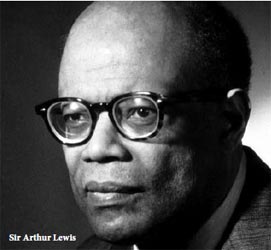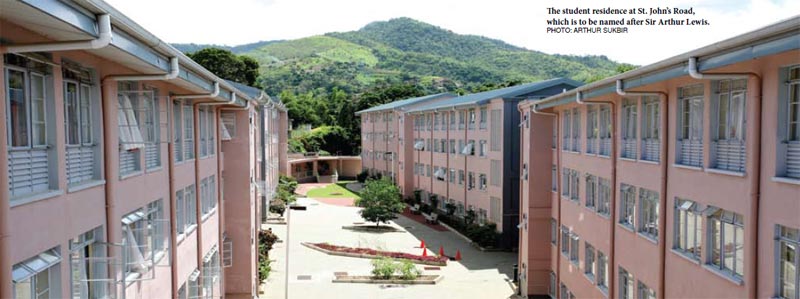
 The sprawling student residence at St John’s Road is to be named after Sir Arthur Lewis (1915-1991), the first Vice-Chancellor of The UWI. Though Lewis spent only five years of his remarkable career at UCWI/UWI, he will always be associated with the regional University. He was the first West Indian Principal of the University College of the West Indies (1959-62) and the first Vice-Chancellor (1962-63) when UWI received its ‘independence’ from London University in 1962. The sprawling student residence at St John’s Road is to be named after Sir Arthur Lewis (1915-1991), the first Vice-Chancellor of The UWI. Though Lewis spent only five years of his remarkable career at UCWI/UWI, he will always be associated with the regional University. He was the first West Indian Principal of the University College of the West Indies (1959-62) and the first Vice-Chancellor (1962-63) when UWI received its ‘independence’ from London University in 1962.
Even before he was officially appointed UCWI Principal, Lewis took part in the final arrangements for the merger of ICTA (Imperial College of Tropical Agriculture) with UCWI, thus creating the second campus at St. Augustine. A photograph on page 43 of my From Imperial College to University of the West Indies shows him, with ICTA and UCWI officials, on the steps of the Administration Building after discussions in March 1959. In July of that year he met in London with Sir Jock Campbell and other members of ICTA’s Governing Board to finalise the merger. So when the official handover of ICTA to UCWI took place in Port of Spain on October 12, 1960, Lewis could take pride in having helped to make the new campus and its ‘ready-made’ Faculty of Agriculture a reality. He gave ‘the speech of the day’ at the ceremony, likening the merger to the marriage of a boy of twelve and a mature lady of forty—the boy would need to be willing to learn and the lady to be tolerant.
As UCWI Principal and UWI Vice-Chancellor, Lewis brought his enormous prestige as a scholar and development economist to the service of the still fledgling regional University.
Born in St Lucia, he had received his BSc and PhD degrees at the London School of Economics (LSE) just before World War II. He taught at LSE for some years, then moved as a full professor to the University of Manchester in 1948, at the remarkably early age of 33.
It was at Manchester (1948-58) that Lewis took up development economics, then a fairly new field in the discipline, publishing his famous 1954 article “Economic Development with Unlimited Supplies of Labour” and his 1955 book, “The Theory of Economic Growth.” During this period he also served as the UN Economic Adviser to Ghana’s Prime Minister, Kwame Nkrumah, and helped to write that country’s first development plan.
Lewis was recruited from Manchester to serve UCWI as its first West Indian Principal in 1959. After leaving UWI in 1963—the year he was knighted—he went to Princeton University, where he stayed until his retirement in 1983. He took a break from academia, however, in 1970-74, when he set up the Caribbean Development Bank and served as its first President.
In 1979, his distinguished and pioneering research on economic development was recognized by the award of the Nobel Prize for Economics. He was the first black person to win a Nobel Prize in any category other than Peace; the first Caribbean person to win one in a category other than Literature; and the first person from the English-speaking Caribbean to win one in any category.
Several buildings or institutions have been named for Arthur Lewis. There is the Sir Arthur Lewis Community College in his native St Lucia (in whose grounds he was buried when he died in 1991); the Arthur Lewis Building at the University of Manchester where he spent ten immensely productive years; and of course our University’s Sir Arthur Lewis Institute of Social & Economic Studies (SALISES). In naming our newest student residence after him, we at St Augustine can also recall that we designated 2008 as the Year of Sir Arthur Lewis—part of a three-year celebration of the three Nobel Laureates from the English-speaking Caribbean.

Bridget Brereton is Emerita Professor of History and author of the 2010 “From Imperial College to The University of the West Indies.” She has been writing this series of articles, Campus History, giving the background to the buildings that have been named after members of the university community. |





